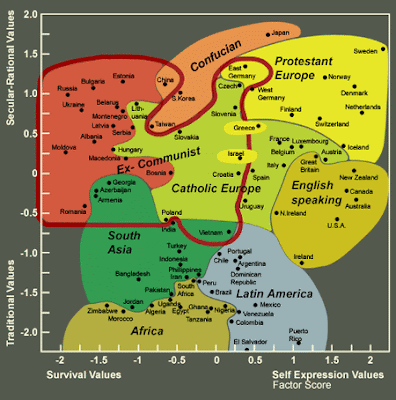 One of the results of the World Values Survey has been the creation of a map showing how the national attitudes are part of larger civilizational clusters of values. The Inglehart Values Map, also known as the Inglehart-Welzel Cultural Map of the World, tends to show how the values of people in each nation are similar to countries with a shared history.
One of the results of the World Values Survey has been the creation of a map showing how the national attitudes are part of larger civilizational clusters of values. The Inglehart Values Map, also known as the Inglehart-Welzel Cultural Map of the World, tends to show how the values of people in each nation are similar to countries with a shared history.
The World Values Surveys were designed to provide a comprehensive measurement of all major areas of human concern, from religion to politics to economic and social life and two dimensions dominate the picture: (1) Traditional/ Secular-rational and (2) Survival/Self-expression values. These two dimensions explain more than 70 percent of the cross-national variance in a factor analysis of ten indicators-and each of these dimensions is strongly correlated with scores of other important orientations.I see some validation of Maslow's Hierarchy of Needs on the horizontal axis. I was pleased to see that Welzel refers to "Maslowian Value Change" in a (downloadable) PowerPoint presentation at Istanbul in November 2006. [Technical note: Apple iWork's Keynote software chokes on the charts in the ppt, claiming they have too many data points, and substituting an image -- just a background gradient. NeoOffice is better but broke some arrows, substituting little empty boxes. (Sorry Steve Jobs, Al Gore.)] Basically, once you have secured oxygen, water, food, clothing, shelter, sex, physical and emotional needs, you can begin to turn your attention to higher-level needs.
The Traditional/Secular-rational values dimension reflects the contrast between societies in which religion is very important and those in which it is not. A wide range of other orientations are closely linked with this dimension. Societies near the traditional pole emphasize the importance of parent-child ties and deference to authority, along with absolute standards and traditional family values, and reject divorce, abortion, euthanasia, and suicide. These societies have high levels of national pride, and a nationalistic outlook. Societies with secular-rational values have the opposite preferences on all of these topics.
The second major dimension of cross-cultural variation is linked with the transition from industrial society to post-industrial societies-which brings a polarization between Survival and Self-expression values. The unprecedented wealth that has accumulated in advanced societies during the past generation means that an increasing share of the population has grown up taking survival for granted. Thus, priorities have shifted from an overwhelming emphasis on economic and physical security toward an increasing emphasis on subjective well-being, self-expression and quality of life. Inglehart and Baker (2000) find evidence that orientations have shifted from Traditional toward Secular-rational values, in almost all industrial societies. But modernization, is not linear-when a society has completed industrialization and starts becoming a knowledge society, it moves in a new direction, from Survival values toward increasing emphasis on Self-expression values.
A central component of this emerging dimension involves the polarization between Materialist and Postmaterialist values, reflecting a cultural shift that is emerging among generations who have grown up taking survival for granted. Self-expression values give high priority to environmental protection, tolerance of diversity and rising demands for participation in decision making in economic and political life. These values also reflect mass polarization over tolerance of outgroups, including foreigners, gays and lesbians and gender equality. The shift from survival values to self-expression values also includes a shift in child-rearing values, from emphasis on hard work toward emphasis on imagination and tolerance as important values to teach a child. And it goes with a rising sense of subjective well-being that is conducive to an atmosphere of tolerance, trust and political moderation. Finally, societies that rank high on self-expression values also tend to rank high on interpersonal trust.
This produces a culture of trust and tolerance, in which people place a relatively high value on individual freedom and self-expression, and have activist political orientations. These are precisely the attributes that the political culture literature defines as crucial to democracy.
.jpg)
Meanwhile, the vertical axis has some strong similarities to the public acceptance of evolution, as reported in Science magazine some time ago. (No access? Try Richard Dawkins!) Are people willing to draw truth from facts, or do they look to megachurch televangelists or ancient texts for truth? In other words, do people understand the scientific method, or is science a cold evil thing, and truth to be found in friends, family, the knowledge of people one loves and respects? (I am trying to be charitable to and have some empathetic understanding of the traditional pole.)
I was interested to see Japan charting at the top of the secular-rational scale, along with other Confucian-colored cultures. The traditional emphasis on learning, literature, and study created a basis for adoption of rational Enlightenment values, and, in China, Marxism. China was testing scholars to fill its bureaucracies while Europe burned witches and cats, long before the Protestant hordes achieved their enlightenment.
I hadn't heard much about the World Values Survey, except for the world happiness results, which were widely reported in the media.





No comments:
Post a Comment